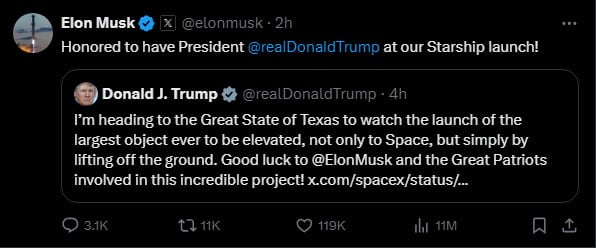Donald Trump joins Elon Musk to watch SpaceX Starship’s liftoff

US President-elect Donald Trump on Tuesday watched Elon Musk’s SpaceX successfully launching the sixth test flight of its Starship rocket alongside the billionaire.
The roughly 400-foot-tall (122-meter-tall) rocket system, designed to land astronauts on the moon and ferry crews to Mars, lifted off at 4 pm CT (2200 GMT) from SpaceX’s sprawling rocket development site in Boca Chica, Texas.
The first stage, called Super Heavy, unexpectedly made a splashdown in the Gulf of Mexico instead of attempting to return to its launchpad, indicating something went wrong.
Starship, in space, will travel around Earth for a planned daytime splashdown in the Indian Ocean some 90 minutes later.
Starship last month demonstrated the novel catch-landing method for the first time, achieving a key milestone in its reusable design. Tuesday’s catch-landing was expected to be “faster/harder,” Musk wrote on social media before the launch.
Trump’s attendance signals a deepening alliance with Musk, who stands to benefit from Trump’s election victory, with the billionaire entrepreneur expected to wield extraordinary influence to help his companies and secure favorable government treatment.
Musk, the world’s wealthiest person, was a prominent supporter of Trump’s presidential election campaign, appearing with him at rallies and backing him with at least $119 million in political support.
“I’m heading to the Great State of Texas to watch the launch of the largest object ever to be elevated, not only to Space, but simply by lifting off the ground,” Trump wrote on social media, wishing Musk luck on the launch.
Trump on Nov. 13 appointed Musk as co-leader of a new government efficiency project that the SpaceX founder and Tesla CEO has said will rid the federal government of wasteful spending and regulations he has called burdensome.
The US Federal Aviation Administration’s regulation of commercial rocket launches has been a source of frustration for Musk, who has complained that the agency impedes his company’s progress in getting to Mars.
But the FAA’s license approval of Tuesday’s Starship launch a little over a month after the rocket’s previous flight was its quickest regulatory turnaround yet for SpaceX, as the agency develops new launch-approval processes meant to keep pace with the US space industry’s growth.
Musk on Tuesday listed four core objectives for the test flight – restarting Starship’s space-tailored engine during flight – key for its in-space maneuverability – and making a more visible ocean landing during the daytime, while past attempts have been at night.
“There are thousands of small design changes also being tested,” Musk said.
SpaceX is eyeing swift advances in Starship development during a second Trump administration. The administration’s space agenda is expected to give NASA’s Artemis program, which is due to return astronauts to the lunar surface, a greater focus on the more ambitious goal of landing people on Mars, Musk’s premier space aspiration.
“We just passed 400 launches on Falcon, and I would not be surprised if we fly 400 Starship launches in the next four years,” SpaceX President and COO Gwynne Shotwell said at the Baron Investment Conference in New York last week, referring to the company’s workhorse rocket.




